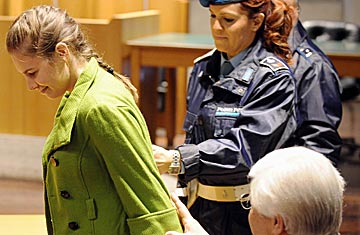
American student Amanda Knox in court in Perugia, Italy, on Dec. 4
(2 of 2)
Many legal observers in the U.S. were dismayed, though not surprised, by the verdict, since they felt all along that Knox had already been convicted in the Italian court of public opinion and had no real shot at a fair trial. Within hours of her arrest, reporters had scoured her MySpace postings. They found her nickname "Foxy Knoxy" and ferreted out drunken videos, publishing them all. A local shopkeeper presented the prosecution with a store video of Sollecito and Knox buying lingerie and making out a few days after the murder.
But Italian journalists who had for two years avidly purveyed press leaks accompanied by a shifting body of evidence — revealed piecemeal as bits of it were knocked down — expressed surprise at the verdict. "This is like Pontius Pilate, washing his hands," said veteran La Repubblica writer Meo Ponte, who told TIME the jurists lacked the courage to refuse a theory already approved by so many officials. Ponte noted that the sentence for Knox — whom Mignini had painted as the instigator and actual killer — was four years less than the 30 years meted out to Guede (who is appealing the verdict). That strongly suggests the jury didn't buy Mignini's theory, leaving open the question: For what act did they really convict Knox?
Defense lawyers contended that Guede, a native of the Ivory Coast, committed the crime by himself. He had been arrested in Milan a week before the murder, after having broken into a nursery school, carrying a knife and items stolen from a Perugia law office a week before. Guede fled to Germany after the murder. When he was apprehended, he did not initially implicate Knox. He said he was in the house on a kind of date with Kercher, went to the bathroom and came out to find her bleeding to death from stab wounds. He later changed his story to suggest that Knox had been in or around the house and that she and Kercher had argued over money.
Still, Knox's attorneys were never able to erase the fact that during a night of questioning four days after the killing, she told police she had "a vision" that she was sitting in the kitchen on the night of the murder, holding her hands over her ears, while her boss, a local bar owner, raped and killed Kercher. She later said she'd been pressured by police to finger the man because she had texted him "See you later" in the hours before the murder — which the Italians took for a confirmed appointment.
Knox has since said she spent the entire night at Sollecito's, smoking pot and having sex, though Sollecito told police he was not certain she had spent the whole night in his house. She said she woke up the next morning, went home to take a shower and noticed the house door open and blood in the bathroom but was not unduly alarmed. After having breakfast with her boyfriend, she claimed, the two returned to the house and noticed a room with a broken window and that Kercher's bedroom door was locked. They called police, but authorities said they did so only after another branch of the Italian police arrived at the house. Police found Kercher's half-naked body under a blanket behind her locked door, a blood-splattered English-Italian dictionary nearby.
Lawyers for Knox and Sollecito said they plan to appeal after the judge (who under Italian law was also a voting member of the jury) files the legally required report explaining the verdict in three months. The appeals process can take up to six years.
There are signs that the Knox case could soon become a diplomatic dispute. U.S. Senator Maria Cantwell of Washington, Knox's home state, called on the U.S. State Department to investigate. "I am saddened by the verdict, and I have serious questions about the Italian justice system and whether anti-Americanism tainted this trial. The prosecution did not present enough evidence for an impartial jury to conclude beyond a reasonable doubt that Ms. Knox was guilty." The U.S. embassy in Italy had sent observers to the trial to watch Mignini's final arguments but did not make any official comment. Although Knox was visited by U.S. embassy officials during her incarceration, the U.S. was not officially involved.
After the verdict, Knox's father Curt silently steered his two younger daughters, crying, through a scrum of television cameras, curious bystanders and inebriated college students. A family member said some of them plan to relocate from Seattle to Italy to live near Knox in prison. She is likely to be moved from incarceration near Perugia, where she has resided the past two years, into a long-term prison.
— With reporting by Pieter Vanhove / PerugiaBurleigh is writing a book on the Knox case, to be published by Broadway Books in 2011.
